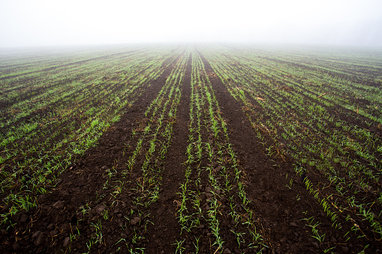OMAFRA cereals specialist says it’s too early to tell
By Diego Flammini
Assistant Editor, North American Content
Farms.com
Winter 2016/2017 in Ontario has been almost anything but.
With temperatures high above seasonal norms and hardly a trace of snow in some parts of the province, it’s looking like the Farmers’ Almanac’s forecast for Ontario may be incorrect.
But with the thermometer generally staying on the plus size of zero lately, should farmers be concerned that winter wheat could break dormancy?
“It's too early to tell what impact the mild weather will have on winter wheat survival,” Joanna Follings, OMAFRA cereals specialist, told Farms.com in an email. “This past fall growers were able to get the crop planted early with many fields being well tillered before going into winter. Although the snow has melted we haven’t experienced long cold snaps that might have impacted the crop.”

Winter wheat field
Farmers with winter wheat tend to agree.
“The crop is always vulnerable to a long list of environmental and weather issues spanning over four seasons,” Maurice Chauvin, a farmer from Pointe aux Roches in Essex County, told Farms.com. “Evaluate the crop in the spring.”
Follings echoed Chauvin’s thoughts, saying farmers should determine winter survival in the spring. She also offered some advice on how producers can increase the chances of their crops surviving the winter.
“Having a uniform crop with good establishment improves the crop’s chances for survival,” she said. “Planting winter wheat early enables the crop to be well tillered before going into winter.
“The winter wheat crop should be assessed for winter survival in late April to early May, with the replant decision being made as late as possible. When evaluating wheat stands you need to count the number of plants per foot of row. Growers should also assess the overall health of the plants themselves to determine if the plants are going to survive or not. When making field assessments, be sure to do a number of stand counts and plant health assessments throughout the entire field.”
According to The Weather Network, some colder temperatures are on the way:
| CIty | Saturday, Jan. 28 | Sunday, Jan. 29 | Monday, Jan 30 |
| Drumbo | -1 | -3 | -4 |
| Chatham | 0 | -2 | -3 |
| Belleville | 0 | -2 | -6 |
| Kemptville | 1 | -4 | -7 |
| Guelph | -1 | -3 | -5 |
| Vineland | 1 | -1 | -3 |